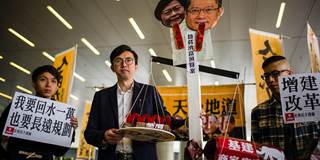For the time being, concrete evidence of policy success in countries like China and India may well be the most effective way to buttress the case for applying non-Western perspectives to national development strategies. But, in the longer term, non-Western thinkers will need to translate their ideas into testable models and theories.
HONG KONG – In 1998, when China’s economic rise was just beginning, Kishore Mahbubani ignited something of a global intellectual firestorm with his book Can Asians Think? Two decades later, with Asia forming the core of the world economy, and China challenging the United States for hegemony in the Asia-Pacific region and even for global leadership, Mahbubani’s question has gained new, and perhaps more profound, resonance.
To be clear, Mahbubani was not asking whether Asians lack other people’s cognitive abilities. Rather, he was questioning whether Asia – a region comprising vastly different countries, from Japan to Singapore – possessed its own intellectual framework, one that lies outside of the dominant Western paradigm. Were there specific Asian values to which the people of the region adhered, and was this inquiry still a viable way to understand the workings of a rapidly modernizing region?
Some observers responded to Mahbubani’s query by asserting that core Asian values – such as hard work, pragmatism, and family – are not specific to Asia. Others countered that Asian values are not only unique, but also superior to those of the West. Mahbubani agreed that Asia had its own values and intellectual traditions, which he argued deserved at least equal respect and consideration as those of the West – not least because of the mixed results of the West’s own frameworks. At the time Mahbubani published his book, the Asian financial crisis of 1997 had just decimated many of the region’s economies, thanks, many Asians believed, to prevailing Western economic ideas.

HONG KONG – In 1998, when China’s economic rise was just beginning, Kishore Mahbubani ignited something of a global intellectual firestorm with his book Can Asians Think? Two decades later, with Asia forming the core of the world economy, and China challenging the United States for hegemony in the Asia-Pacific region and even for global leadership, Mahbubani’s question has gained new, and perhaps more profound, resonance.
To be clear, Mahbubani was not asking whether Asians lack other people’s cognitive abilities. Rather, he was questioning whether Asia – a region comprising vastly different countries, from Japan to Singapore – possessed its own intellectual framework, one that lies outside of the dominant Western paradigm. Were there specific Asian values to which the people of the region adhered, and was this inquiry still a viable way to understand the workings of a rapidly modernizing region?
Some observers responded to Mahbubani’s query by asserting that core Asian values – such as hard work, pragmatism, and family – are not specific to Asia. Others countered that Asian values are not only unique, but also superior to those of the West. Mahbubani agreed that Asia had its own values and intellectual traditions, which he argued deserved at least equal respect and consideration as those of the West – not least because of the mixed results of the West’s own frameworks. At the time Mahbubani published his book, the Asian financial crisis of 1997 had just decimated many of the region’s economies, thanks, many Asians believed, to prevailing Western economic ideas.